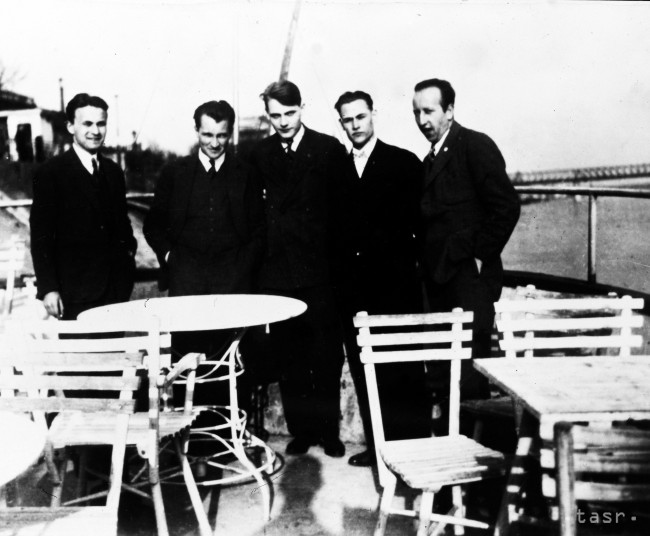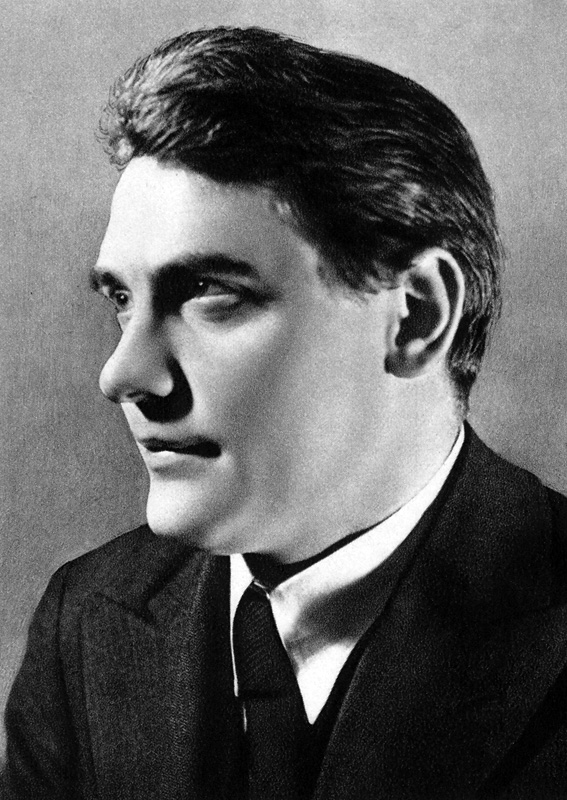|
Vladimír Clementis
Vladimír "Vlado" Clementis (20 September 1902 – 3 December 1952) was a Slovak politician, lawyer, publicist, literary critic, author and a prominent member of the Czechoslovak Communist Party. Between 1948 and 1950, he served as Minister of Foreign Affairs of Czechoslovakia. In 1952, he was accused of "Titoism" and "national deviation" during the Slánský trial and executed. Biography After attending gymnasium in Skalica, Clementis studied in Germany and France before graduating with a Ph.D. from the Faculty of Law of Charles University in Prague. During his studies, he took an interest in the philosophy of Emanuel Rádl, František Krejčí and Vilém Forster. He also served as co-editor of '' Dav'', a cultural and political journal that had broad influence in inter-war Czechoslovakia, particularly among Slovaks. As editor of ''Dav'', Clementis published works by writers such as Martin Rázus, Milo Urban, Ján Smrek, Gejza Vámoš and T. Gašpar. In addition, togethe ... [...More Info...] [...Related Items...] OR: [Wikipedia] [Google] [Baidu] |
Ministry Of Foreign Affairs (Czechoslovakia)
The Ministry of Foreign Affairs of Czechoslovakia refers to the foreign affairs ministry which was responsible for representing internationally Czechoslovakia during its existence, from 1918 to 1992. List of ministers First Czechoslovak Republic (1918–1938) Second Czechoslovak Republic (1938–1939) Czechoslovak government-in-exile (1940–1945) Third Czechoslovak Republic (1945–1948) Czechoslovak Socialist Republic (1948–1989) Czech and Slovak Federative Republic (1989–1992) Timeline See also * Ministry of Foreign Affairs (Czech Republic) ** Minister of Foreign Affairs (Czech Republic) * Ministry of Foreign Affairs (Slovakia) ** Minister of Foreign Affairs (Slovakia) External linksCzechoslovak ministries, etc – Rulers.org {{DEFAULTSORT:Ministry Of Foreign Affairs (Czechoslovakia) Foreign ministers of Czechoslovakia Czechoslovakia Czechoslovakia ( ; Czech language, Czech and , ''Česko-Slovensko'') was a landlocked country ... [...More Info...] [...Related Items...] OR: [Wikipedia] [Google] [Baidu] |
Germany
Germany, officially the Federal Republic of Germany, is a country in Central Europe. It lies between the Baltic Sea and the North Sea to the north and the Alps to the south. Its sixteen States of Germany, constituent states have a total population of over 84 million in an area of , making it the most populous member state of the European Union. It borders Denmark to the north, Poland and the Czech Republic to the east, Austria and Switzerland to the south, and France, Luxembourg, Belgium, and the Netherlands to the west. The Capital of Germany, nation's capital and List of cities in Germany by population, most populous city is Berlin and its main financial centre is Frankfurt; the largest urban area is the Ruhr. Settlement in the territory of modern Germany began in the Lower Paleolithic, with various tribes inhabiting it from the Neolithic onward, chiefly the Celts. Various Germanic peoples, Germanic tribes have inhabited the northern parts of modern Germany since classical ... [...More Info...] [...Related Items...] OR: [Wikipedia] [Google] [Baidu] |
Mikuláš Galanda
Mikuláš Galanda (4 May 1895 – 5 June 1938) was a painter and illustrator who was one of the most important pioneers and propagators of Slovak modern art. He is buried in the National Cemetery in Martin. Birth and education He was born in Mala Vieska near Turčianske Teplice. From 1914 to 1916 he studied at the Academy of Fine Arts in Budapest. In 1922 he enrolled in the Academy of Arts, Architecture and Design in Prague, where he studied under Prof. V. H. Brunner. From 1923 to 1927 he studied at the Academy of Fine Arts in Prague under August Brömse and Franz Thiele. Career From 1924 to 1926, Galanda was the first graphical editor for '' Dav'' magazine. He was given approval to teach drawing in 1928, and in that year in Prague he met Maria Boudova, whom he married in 1931. He moved to Bratislava in 1929 and started to teach at 1st girls' town school. From 1929 to 1932 he shared an atelier together with Ľudovít Fulla situated in 5, Trnavska street in Bratislava ... [...More Info...] [...Related Items...] OR: [Wikipedia] [Google] [Baidu] |
Ľudovít Fulla
Ľudovít Fulla (27 February 1902, Ružomberok – 21 April 1980, Bratislava) was a Slovak painter, graphic artist, illustrator, stage designer and art teacher. He is considered one of the most important figures of Slovak creative art in the 20th century. Style Fulla's work was fundamentally important for the establishment of Slovak modernism. His personal style is characterized by a special "poetry of the image" relying on surface and decoration, a synthesis of rational and emotional elements, brilliant colour, knowledge of folk art, East Slavonic iconography and world Modernism. Ľudovít Fulla was predominantly inspired by the Prague modernist milieu. In his works, the principles of Wassily Kandinsky, Marc Chagall, Pablo Picasso and Paul Klee can be found. In the only manifesto of Slovak modernists, he and his friend Mikuláš Galanda Mikuláš Galanda (4 May 1895 – 5 June 1938) was a painter and illustrator who was one of the most important pioneers and propagators of S ... [...More Info...] [...Related Items...] OR: [Wikipedia] [Google] [Baidu] |
Laco Novomeský
Laco Novomeský (full name: Ladislav Novomeský) (27 December 1904, Budapest – 4 September 1976, Bratislava) was a Slovak poet, writer and communist politician. Novomeský was a member of the DAV group; after The Second World War he was commissioner of education and culture of Socialist Czechoslovakia. A prominent Czechoslovak politician, he was persecuted in the 1950s and later rehabilitated in the 1960s. Early life Novomeský was born in to the family of a tailor that immigrated from Senica to Budapest, where he was born. The family moved back to Senica to continue his studies. He later graduated from the teacher training institute in Modra. Novomeský started to work as a teacher while at the same time enrolling as an external student of the Faculty of Arts at the Comenius University where he became involved in literary and political activities. Literary and political career He joined the Communist Party of Czechoslovakia in 1925 and worked for its press. He was the ed ... [...More Info...] [...Related Items...] OR: [Wikipedia] [Google] [Baidu] |
Ján Smrek
Ján is a Slovak form of the name John. Notable people named Ján * Ján Bahýľ (1856–1916), inventor * Ján Cuper (1946–2025), Slovak politician * Ján Čapkovič (born 1948), football player * Ján Čarnogurský (born 1944), Slovak politician * Ján Cikker (1911–1989), composer * Ján Ďurica (born 1981), football player * Ján Fabo (born 1963), sport shooter * Ján Figeľ (born 1960), politician * Ján Golian (1906–1945), soldier, military leader of Slovak National Uprising * Ján Havlík(1928–1965), Roman Catholic martyr * Ján Hollý (1785–1849), poet and translator * Ján Kadár, film director * Ján Kocian, football player * Ján Kollár, writer * Ján Kožiak, football player * Ján Lašák, ice-hockey goalkeeper * Ján Lunter, Slovak politician * Ján Michalko (1947–2024), Slovak cross-country skier. * Ján Mucha (born 1982), Slovak footballer * Ján Packa (born 1952), Slovak handball player * Ján Polgár (1929-2023), Slovak football player * Ján Slota ... [...More Info...] [...Related Items...] OR: [Wikipedia] [Google] [Baidu] |
Milo Urban
Milo Urban (pseudonyms: ''Ján Rovňan ml.'', ''Podbabjagurský'') (24 August 1904 – 10 March 1982) was Slovak writer, translator, journalist and an important representative of modern Slovak literature. Biography Urban finished elementary school in Zázrivá and Podhorany, and then attended the gymnasia in Trstená and Ružomberok. From 1921, he worked as a journalist and editor for various newspapers and magazines. Between 1940 and 1945, Urban was editor-in-chief of ''Gardista'', a propagandist magazine published by the Hlinka Guard, the paramilitary wing of the ruling Slovak People's Party in the clerico-fascist Slovak State. Towards the end of World War II he fled the advancing Red Army to Austria, but was deported back to Czechoslovakia in 1947. The following year, Urban was put on trial for his role as editor of ''Gardista'' during the war, found guilty of collaboration and deprived of his publishing rights. From the 1950s he made a living as a translator. Urban di ... [...More Info...] [...Related Items...] OR: [Wikipedia] [Google] [Baidu] |
Martin Rázus
Martin Rázus (pseudonym A pseudonym (; ) or alias () is a fictitious name that a person assumes for a particular purpose, which differs from their original or true meaning ( orthonym). This also differs from a new name that entirely or legally replaces an individual's o ...: ''Mrazák''; 18 October 1888 – 8 August 1937) was a Slovak poet, dramatist, writer, politician, and Lutheran priest References Sources * Michal Gáfrik: ''Martin Rázus I.'', Národné literárne centrum 1998, . * Michal Gáfrik: ''Martin Rázus II.'', Národné literárne centrum 2000, . 1888 births 1937 deaths Writers from Liptovský Mikuláš People from the Kingdom of Hungary Slovak Lutherans Slovak National Party (historical) politicians Members of the Chamber of Deputies of Czechoslovakia (1929–1935) Members of the Chamber of Deputies of Czechoslovakia (1935–1939) Slovak poets 20th-century Slovak poets 20th-century Lutherans {{Slovakia-writer-stub ... [...More Info...] [...Related Items...] OR: [Wikipedia] [Google] [Baidu] |
Dav (journal)
''Dav'' (based on the initials of the first names of Daniel Okáli, Andrej Sirácky, and Vladimír Clementis) was a leftist journal published between 1924 and 1937 with intervals in Prague and then in Bratislava by the group Davisti. The journal featured illustrations by Frans Masereel, George Grosz, Marc Chagall and others. It had a Marxist (and later members Titoist) stance. A reprint edition came out in 1965. DAV included important Slovak writers, poets and cultural workers, scientists and philosophers, politicians and lawyers, literary critics and graphic designers and visual artists like Ladislav Novomeský, Ján Poničan, Peter Jilemnický, Andrej Bagar, Jozef Tomášik-Dumín, Jarko Elen, Fraňo Kráľ, Andrej Siracký, Ladislav Szántó, Gustáv Husák, Vladimir Clementis, Eduard Urx, Daniel Okáli, Alexander Matuška, Ľudovít Fulla, Mikuláš Galanda and others. Revue was also a mediator of books by socialist writers (especially poets) like Ján Rob ... [...More Info...] [...Related Items...] OR: [Wikipedia] [Google] [Baidu] |
Vilém Forster
Vilém or Vilem is Czech form of Germanic name William. It may refer to: *Vilém Blodek (1834–1874), Czech composer, flautist, and pianist * Vilém Dušan Lambl (1824–1895), Czech physician *Vilém Flusser (1920–1991), philosopher born in Czechoslovakia * Vilém Gajdušek (1895–1977), Czech optician and prominent telescope designer * Vilém Goppold, Jr. (born 1893, date of death unknown), a Bohemian Olympic fencer * Vilém Goppold von Lobsdorf (1869–1943), Bohemian fencer and olympic medalist in sabre competition * Vilém Heš (1860–1908), Czech operatic bass *Vilém Heckel (1918–1970), Czech photographer *Vilém Klíma (1906–1985), Czech electrical engineer *Vilém Kurz (1872–1945), Czech pianist, piano teacher, professor *Vilém Loos (1895–1942), Czechoslovak ice hockey player *Vilém Lugr (1911–1981), Czech footballer and football manager *Vilém Mandlík, Olympic 200 metre semi-finalist for Czechoslovakia in 1956 *Vilém Mathesius (1882–1945), Czech lingu ... [...More Info...] [...Related Items...] OR: [Wikipedia] [Google] [Baidu] |
František Krejčí
František () is a masculine Czech and Slovak given name. It is a cognate of Francis, Francisco, François and Franz. It can be also surname (feminine: Františková). Notable people with the name include: Given name Arts *Frank Daniel (František Daniel) (1926–1996), Czech film director, producer and screenwriter *František Bartoš (folklorist) (1837–1906), Moravian ethnomusicologist and folklorist *František Bělský, known as Franta Belsky (1921–2000), Czech sculptor *František Bílek (1872–1941), Czech sculptor and architect *František Brikcius, Czech cellist *František Brixi (1732–1771), Czech composer *František Čáp (1913–1972), Czech film director and screenwriter * František Čelakovský (1799–1852), Czech writer and translator *František Čermák (painter) (1822–84), Czech painter * František Doucha (1810–1884), Czech literary translator and writer *František Drdla (1868–1944), Czech violinist and composer *František Drtikol (1883–1961) ... [...More Info...] [...Related Items...] OR: [Wikipedia] [Google] [Baidu] |



